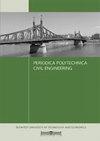Influence of Climate Change on Probability of Carbonation-Induced Corrosion Initiation
IF 1.4
4区 工程技术
Q3 ENGINEERING, CIVIL
引用次数: 0
Abstract
The consequences of climate change on infrastructure, particularly reinforced concrete (RC) bridges, have rapidly increased in recent years. These consequences are primarily driven by the surge in CO2 emissions, which significantly impacts the carbonation depth of RC structures. This study aims to investigate the probability of carbonation-induced corrosion initiation (PCICI) in RC bridge elements. To achieve this, the investigation incorporates a range of concrete covers, varying from 30 to 50 mm, and considers different concrete mixes with cement contents of 400, 350, and 250 kg/m3. The investigation utilizes the Monte-Carlo simulation method, considering different representative concentration pathways (RCPs) to account for two emission scenarios: RCP2.6 (low emission scenario) and RCP8.5 (high emission scenario). By analyzing projected CO2 concentrations and maximum temperature, the study provides insights into the potential corrosion initiation risks in RC bridges. The findings indicated a significant 66.3% increase in PCICI for a cement content of 250 kg/m3, compared to 400 kg/m3, under the RCP8.5 scenario, specifically when using a concrete cover of 30 mm by 2100. The study also revealed that the PCICI approached an approximate value of zero when concrete covers were set at 45 and 50 mm regardless of the variations in cement contents and the duration considered, for both the RCP2.6 and RCP8.5 scenarios.气候变化对碳致腐蚀起始概率的影响
近年来,气候变化对基础设施,特别是钢筋混凝土(RC)桥梁的影响迅速增加。这些后果主要是由二氧化碳排放的激增所驱动的,这显著影响了RC结构的碳化深度。本研究旨在探讨RC桥梁构件碳化诱发腐蚀的可能性。为了实现这一目标,该研究采用了一系列从30到50毫米不等的混凝土覆盖层,并考虑了水泥含量为400、350和250 kg/m3的不同混凝土混合物。本研究采用蒙特卡罗模拟方法,考虑不同的代表性浓度路径(rcp),分别考虑RCP2.6(低排放情景)和RCP8.5(高排放情景)两种排放情景。通过分析预计的二氧化碳浓度和最高温度,该研究为RC桥梁的潜在腐蚀引发风险提供了见解。研究结果表明,与RCP8.5情景下的400 kg/m3相比,当水泥含量为250 kg/m3时,PCICI显著增加了66.3%,特别是当到2100年使用30 mm的混凝土覆盖层时。研究还表明,在RCP2.6和RCP8.5两种情况下,无论水泥含量和持续时间的变化如何,当混凝土覆盖层设置为45和50 mm时,PCICI都接近于接近零的近似值。
本文章由计算机程序翻译,如有差异,请以英文原文为准。
求助全文
约1分钟内获得全文
求助全文
来源期刊

Periodica Polytechnica-Civil Engineering
工程技术-工程:土木
CiteScore
3.40
自引率
16.70%
发文量
89
审稿时长
12 months
期刊介绍:
Periodica Polytechnica Civil Engineering is a peer reviewed scientific journal published by the Faculty of Civil Engineering of the Budapest University of Technology and Economics. It was founded in 1957. Publication frequency: quarterly.
Periodica Polytechnica Civil Engineering publishes both research and application oriented papers, in the area of civil engineering.
The main scope of the journal is to publish original research articles in the wide field of civil engineering, including geodesy and surveying, construction materials and engineering geology, photogrammetry and geoinformatics, geotechnics, structural engineering, architectural engineering, structural mechanics, highway and railway engineering, hydraulic and water resources engineering, sanitary and environmental engineering, engineering optimisation and history of civil engineering. The journal is abstracted by several international databases, see the main page.
 求助内容:
求助内容: 应助结果提醒方式:
应助结果提醒方式:


